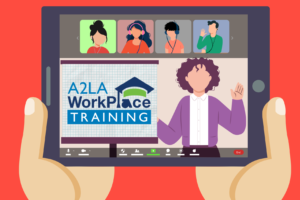AWPT Course Accreditation through The International Accreditors of Continuing Education and Training
A2LA WorkPlace Training (AWPT) is a proud member of The International Accreditors of Continuing Education and Training (IACET). The organization has played an integral part in advancing the work of AWPT, and thanks to IACET, AWPT is able to provide thorough training with proven methods on an abundance of different curricula. Our development, content planning, monitoring, and improvement of processes are verified against the IACET 2018 Standard.
Lessons Learned from FDA Warning Letters
Many of AWPT’s customers are required to adhere to The FDA’s Code of Federal Regulations (CFR) for their calibration activities. As a helpful exercise, AWPT collaborator Walter Nowocin, Life Sciences Product Manager at IndySoft Corporation, collected information from several real but anonymized FDA warning letters to better understand what circumstances led to these letters. Included are four excerpts from those FDA warning letters, with identifiable information redacted, accompanied by comments on how the problems cited in these warning letters can be avoided.
How Auditors can Improve their Interpersonal Skills
There are very few people in the world who enjoy auditing – whether they’re conducting or experiencing one, but a well-planned, well-executed audit provides incredibly valuable insight into an organization’s systems and functions. Part of that all-important planning and execution is accounting for the human factors involved: things like communication, trust, and teamwork. The value an organization gets from an audit will be much greater if there is a positive relationship between auditors and staff, and the overall experience will be more unifying and less disruptive. Make no mistake, the technical expertise of your auditor is crucial, but an auditor’s interpersonal skills are equally important and far more often overlooked.
How to Create a Document Control System
The particulars of each organization’s document control system may vary, but the principles that inform the design of a consistent, effective, and logical system are universal. Whether you’re seeking conformance to a specific standard, like an ISO standard, or building a system to meet your own internal quality goals and culture, your development process should be driven by what you expect your document control system to achieve. Bear in mind that an effective document control system is not just a place for files to live when you’re not using them, but a set of processes for editing, labeling, retrieving, storing, and reviewing those documents in an orderly and consistent way to form a logical system.
Contract Training: A More Individualized Approach
Traditional public courses and highly individualized one-on-one training each have their own advantages and disadvantages, but one effective way that AWPT bridges the gap between classroom-style teaching and individualized needs is with contract training. Contract training is conducted by an AWPT instructor at a time and place chosen by the customer, or – as is currently the case – remotely via private Virtual Classroom sessions. Contract training is attractive to many organizations because they can set their own schedule for the courses, rather than attending public classes at fixed dates and times, but the benefits go beyond convenience.
How to Become a Certified Calibration Technician
The Certified Calibration Technician (CCT) program was created by the American Society for Quality (ASQ) and serves as a standardized way for calibration technicians to demonstrate their understanding of concepts related to their field. Although certification is not necessary to get an entry-level job in calibration, it can be a major advantage for those looking to advance in their careers.
Accreditation vs Certification: What's the Difference?
The world of conformity assessment has its own specialized jargon that can make understanding requirements challenging, especially to organizations who are pursuing accreditation for the first time. We find that our customers often try to find information on ISO/IEC 17025 certification, only to learn that what they actually need is ISO/IEC 17025 accreditation, or may research product registration, but ultimately learn that in their region the process is called certification. In ordinary speech, the words accreditation, certification, and registration are often used interchangeably, but the International Organization for Standardization (ISO) has specific definitions for these terms that differ somewhat from their everyday use.
What You Need to Know About the FSMA Laboratory Accreditation Rule
Food testing labs will soon see their regulatory environment change somewhat as part of the FDA’s Food Safety Modernization Act (FSMA), which seeks to implement its own laboratory accreditation program for food testing labs. The goal of this program is to ensure the safety of the U.S. food supply and protect U.S. consumers by helping ensure appropriate oversight of certain food testing that is relevant to public health. It will also ensure that the testing is done according to appropriate model standards which will help produce consistently reliable and valid test results.
When, Why, and How to Switch to a Digital QMS
Digital quality management systems, also called “eQMS,” are becoming increasingly common, especially as the technology that supports them becomes more widely available and user-friendly. The COVID-19 pandemic has made remote access to information more important than ever and highlighted the shortcomings of traditional paper-based QMS, but the benefits of switching to an eQMS extend far beyond the unique challenges imposed by a global pandemic. Digital QMS allow for better accessibility, better document control, faster and more streamlined processes, and other advantages that affect both efficiency and company culture. The transition from a traditional paper system to an eQMS, however, requires a commitment of time and resources that often drives decision-makers to put it off for as long as possible.
Document Review Tips to Support your Internal Audit
Whether you’re approaching the process for the first time or have dozens of audits under your belt, conducting a document review as part of your internal audit to can be intimidating. A2LA WorkPlace Training instructors frequently get questions from learners about document review best practices and what documents require the most attention during a review. Unfortunately, there is no one-size-fits-all answer. Depending on your facility, your industry, and the standard or standards you are accredited to, your experience will be somewhat different. There are, however, strategic ways to approach a document review that will help to set you up for success.










